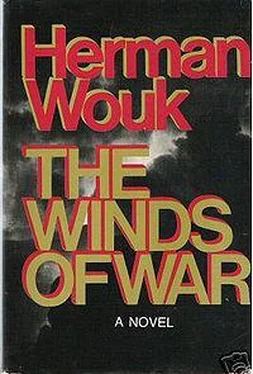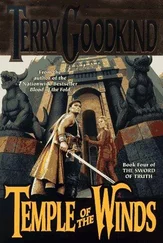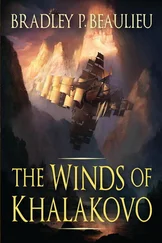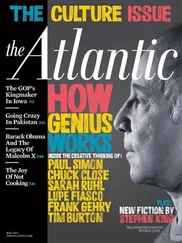Herman Wouk - The Winds of War
Здесь есть возможность читать онлайн «Herman Wouk - The Winds of War» весь текст электронной книги совершенно бесплатно (целиком полную версию без сокращений). В некоторых случаях можно слушать аудио, скачать через торрент в формате fb2 и присутствует краткое содержание. Год выпуска: 1971, Издательство: Collins, Жанр: Историческая проза, на английском языке. Описание произведения, (предисловие) а так же отзывы посетителей доступны на портале библиотеки ЛибКат.
- Название:The Winds of War
- Автор:
- Издательство:Collins
- Жанр:
- Год:1971
- ISBN:нет данных
- Рейтинг книги:4 / 5. Голосов: 1
-
Избранное:Добавить в избранное
- Отзывы:
-
Ваша оценка:
- 80
- 1
- 2
- 3
- 4
- 5
The Winds of War: краткое содержание, описание и аннотация
Предлагаем к чтению аннотацию, описание, краткое содержание или предисловие (зависит от того, что написал сам автор книги «The Winds of War»). Если вы не нашли необходимую информацию о книге — напишите в комментариях, мы постараемся отыскать её.
About the Author
Herman Wouk's acclaimed novels include the Pulitzer-Prize winning
;
;
;
;
;
; and
.
The Winds of War — читать онлайн бесплатно полную книгу (весь текст) целиком
Ниже представлен текст книги, разбитый по страницам. Система сохранения места последней прочитанной страницы, позволяет с удобством читать онлайн бесплатно книгу «The Winds of War», без необходимости каждый раз заново искать на чём Вы остановились. Поставьте закладку, и сможете в любой момент перейти на страницу, на которой закончили чтение.
Интервал:
Закладка:
“Say, isn’t that ‘Stardust’?” Natalie put in. “It sounds a bit like ‘Stardust.’ Dance with me.”
Byron thought Slote looked more like her uncle than her sweetheart, steering her clumsily around the floor. But Natalie’s clinging attitude, closed eyes, and touching cheek weren’t the ways of a niece. They exchanged a few laughing words, then Natalie said something that made Slote look serious and shake his head. They argued as they danced.
“I’ll find him without you,” Natalie was saying as they came back to the table.
“I didn’t say I wouldn’t help you find him. I said if you’re going to talk to him about going to Medzice—”
“Just forget it. Forget I mentioned it.”
Natalie glowered at the meat on her plate. Slote took two more shots of vodka. To lighten the atmosphere, Byron asked Slote about the workings of the embassy. Looking relieved, Slote turned on the measured voice. The alcohol hadn’t blurred his brain; it made him talkative. He sketched the organization and said that he was in the political section, but that since his arrival, he had been preoccupied with the flood of emigrants, as had everybody else.
“Were you fellows surprised by the pact?”
“Naturally. Even the Poles were struck dumb, and their history they’ve seen everything. But nobody can predict Hitler. That’s his genius, if you want to call it that. He does have an instinct for the breathtaking.”
The cloud was clearing from Natalie’s face. “Leslie, why did Stalin go along?”
“Honey, that’s perfectly simple. Hitler offered him a piece of cake on a gold platter, and he simply said, ‘Yes, thank you!’ Stalin’s completely turned the tables on England and France now. They froze him out of Munich. In effect, they handed Czechoslovakia to Hitler and said, ‘Here, boy, leave us alone and go smash Russia.’ Now Stalin’s done a Munich in reverse. ‘No, no, here , boy, take Poland , and go and smash the West.’” With little rapid puffs of blue smoke, clearly enjoying the chance to expound, Slote went on, “Lord, how the British have been asking for this! An alliance with Russia was their one chance to stop Germany. They had years in which to do it. All of Stalin’s fear of Germany and the Nazis was on their side. And what did they do? Dawdle, fuss, flirt with Hitler, and give away Czechoslovakia. Finally, finally, they sent some minor politicians on a slow boat to see Stalin. When Hitler decided to gamble on this alliance, he shot his foreign minister to Moscow on a special plane, with powers to sign a deal. And that’s why we’re within inches of a world war.”
“Is it going to come?” Natalie asked.
“Why, I thought you and Aaron were the authorities for the view that it won’t.”
“I’m not ready to panic. It just seems to me that Hitler will get what he wants, as usual.”
Slote’s face turned pinched and sombre. He pulled at the pipe, sucking in his pallid cheeks. “No. The Poles now have the signed British guarantee. Very gallant; very irrational, very belated, and probably futile. To that extent we’re back in 1914. Poland can plunge the world in by standing firm. It’s all up to Hitler. If he wants to arm some more first, the crisis will subside, and that seems to be in the wind at the moment. But for all we know, he’s already given the order to march. That’s why I’m being such a pill about Medzice. Down there, in the next two weeks, you have a fifty-fifty chance of being captured by German soldiers. I do think that’s a bit risky, dear.”
After dinner Slote drove them to another part of town: street after street of old brick houses of three and four stories, with shops everywhere at ground level. Here indeed were Jews by the thousands, strolling on the sidewalks through narrow cobbled streets, looking out of windows, sitting in shop doorways. On the street corners knots of bearded men argued with loud voices and sweeping gestures, as on Manhattan’s Lower East Side. Many of the men wore kaftans, or else the boots, blouses and caps of the countryside. There were men in ankle-length black coats and black hats, and a few youngsters in army uniforms. There were some prosperous people, too, smooth-shaven men wearing bowlers and well-groomed women looking much like the Warsaw Gentiles around the Europeiski. Children darted about at their street games, boys in caps and short trousers and girls in neat colored frocks, and their mothers gossiped as they watched them.
I thought you said they were all storming the embassy,” Byron remarked to Slote.
“There are three hundred and fifty thousand of them, Byron. Maybe one in a hundred has foresight. That puts three or four thousand hammering at our doors. The rest believe what they want to believe and vaguely hope for the best. The government keeps telling everybody there won’t be a war.”
Natalie was looking around with an absent, pleased expression at the horse-drawn wagons and handcarts in the streets, and at an old trolley car clanking by. “My parents described all this to me when I was a child,” she said. “It seems not to have changed.” People stopped and looked after the embassy car as it passed. Once Slote halted to ask directions. The Jews came clustering around, but gave only vague cautious answers in Polish. “Let me try,” Natalie said, and she began to talk Yiddish, causing an astonished outbreak of laughter, followed by a burst of warm, friendly talk. A chubby boy in a ragged cap volunteered to run ahead of the car and show the way. They set off after him.
“Well done,” Slote said.
“I can hack out Yiddish after a fashion, if I must,” Natalie said. “Aaron’s a master of it, though he never utters a Yiddish word.”
Natalie and Slote got out at a gray brick apartment building with tall narrow windows, and ornate iron door, and window boxes of blooming geraniums. It overlooked a small green park, where Jews congregated on the benches and around a gushing fountain in noisy numbers. Curious children ran from the park to ring Byron in the American car. Under their merry stares, as they freely discussed him and the machine, Byron felt somewhat like an ape behind glass. The faces of the Jewish children were full of life and mischief, but they offered no discourtesy, and gave him shy smiles. He wished he had gifts for them. He took his fountain pen from his pocket, and through the open window offered it to a black-haired girl in a lilac dress with white lace cuffs and collar. The girl hung back, blinking wary dark brown eyes. The other children encouraged her with shouts and giggles. At last she took the pen, her little cool fingers brushing his hand for a moment, and ran lightly away.
“Well, wouldn’t you know. He’s not there,” Natalie said, returning to the car with Slote a few minutes later. “Gone to Medzice for his son’s wedding, with the whole family. Just my luck. Aaron told me he deals in mushrooms, but can that be such a good business? He’s evidently well off.”
“Unusually so.” Slote was starting the car. “This must the best apartment house around here.”
The little girl in lilac reappeared, leading her parents, the father in a knee-length gray frock coat and a wide-brimmed gray hat, the mother kerchiefed, wearing a German-tailored brown suit, and carrying a baby in a pink blanket.
“He’s thanking you,” Slote said to Byron, as the father gravely spoke in Polish through the window, holding the fountain pen, “and he says it’s much too expensive, and please take it back.”
“Tell him the American fell in love with his daughter. She’s the most beautiful girl in the world, and she must keep it.”
The father and mother laughed when Slote translated. The little girl shrank against her mother’s skirt and shot Byron an ardent look. The mother undid from her lapel a gold brooch with purple stones, and pressed it on Natalie, who tried to decline it, speaking in Yiddish. Again, this caused surprise and a cascade of jocund talk, the upshot of which was that she had to keep the brooch. The little girl kept the pen, and they drove off to shouted farewells.
Читать дальшеИнтервал:
Закладка:
Похожие книги на «The Winds of War»
Представляем Вашему вниманию похожие книги на «The Winds of War» списком для выбора. Мы отобрали схожую по названию и смыслу литературу в надежде предоставить читателям больше вариантов отыскать новые, интересные, ещё непрочитанные произведения.
Обсуждение, отзывы о книге «The Winds of War» и просто собственные мнения читателей. Оставьте ваши комментарии, напишите, что Вы думаете о произведении, его смысле или главных героях. Укажите что конкретно понравилось, а что нет, и почему Вы так считаете.












